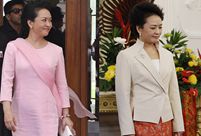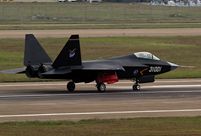 Bikini show in 2014 China Final of Miss Tourism World
Bikini show in 2014 China Final of Miss Tourism World
 Close-up view of August Aerobatic Team
Close-up view of August Aerobatic Team
 Goddesses married in 2014
Goddesses married in 2014
 Polar region photos raise worldwide awareness of global warming
Polar region photos raise worldwide awareness of global warming
 Get off at the last stop — Beijing Subway in vision
Get off at the last stop — Beijing Subway in vision
 Top 100 beauties in the world!
Top 100 beauties in the world!
 Gallery: Who is the most beautiful one?
Gallery: Who is the most beautiful one?
 If you like autumn, put your hands in the air!
If you like autumn, put your hands in the air!
 Fan Bingbing's "Queen style" in new play
Fan Bingbing's "Queen style" in new play
 Lingerie show at 2014 Miss China
Lingerie show at 2014 Miss China
HONG KONG, Dec. 13 -- China and ASEAN nations should accelerate the process of regional economic integration and promote regional connectivity as their regional economic development and cooperation has taken on a new pattern and offered new prospect, said a Chinese expert at the ASEAN Development Forum held here Saturday.
Wang Qin, director of the Center for Southeast Asian Studies at Xiamen University, told the forum that over the past decade, China- ASEAN relations have entered a new era of comprehensive cooperation and growth as institutional arrangement for regional economic integration has been gradually put into place and all- round, multi-layered and wide-ranging economic cooperation furthered deepened.
He noted that China and ASEAN enjoy geographical proximity, cultural affinity, a historical bond and closely entwined interests. China and ASEAN nations account for some 30 percent of the world population, and a combined economy of more than 10 trillion U.S. dollars, which is second only to the United States and the European Union.
Despite a widening gap in the pace of economic growth and GDP between China and ASEAN nations as a whole, many ASEAN nations have showed tremendous development potentials. Together they have become the fastest growing major market in the world, he said.
However, he also pointed out some problems in the development of China-ASEAN economic ties, such as lack of variety in the forms of bilateral economic cooperation, excessive government input and imbalance in bilateral trade and economic cooperation between China and ASEAN nations, between trade of goods and services, between mutual investment and between government and enterprises.
But he expressed the confidence that their diverse natural resources, industrial structures, and the fact that they are at different stages of economic development and different positions in the global production networks and regional industrial chains have made both sides highly complementary to each other economically and enabled their economic cooperation to enjoy great potentials.
Noting that many ASEAN nations are China' s neighbors, and the regional block constitutes China's important partner in achieving regional economic integration, he said China should readjust its strategy for foreign trade amid the changing global and regional political and economic landscape by giving priority to its surrounding regions and enhancing China-ASEAN economic cooperation and regional economic integration so as to better deal with both the opportunity and challenges brought about by a new round of regional economic integration.
Meanwhile, he said that regional economic cooperation would remain the dominant aspect of China-ASEAN bilateral ties and called for efforts to promote comprehensive and multi-layered economic cooperation and the institutional arrangement for regional economic integration.
As the global supply chain and value chain are being readjusted and reshaped, and both China and ASEAN form important links in these chains, they should seize this opportunity to strengthen cooperation in infrastructure construction, remove barriers to the flow of goods and services so as to achieve connectivity of infrastructure and mechanism and strive to move from the low end of the value chain to both ends of that chain, he said.
On regional connectivity, the expert said as China-ASEAN regional connectivity covers the three major areas of infrastructure, mechanism and people-to-people exchanges, plans should be made to initiate concrete projects, set up finance platforms and improve coordination to build up communication networks on land, at sea and on air. Efforts should be made to enhance maritime connectivity and maritime economic cooperation and build up major regional market and passageways.
Wang made a four-point proposal on promoting China-ASEAN economic cooperation:--China should give priority to ASEAN in pushing forward its initiative of "One Belt, One Road"; --Both sides should make efforts to accelerate regional integration;-- Efforts should be made to enhance connectivity;--Build new regional industrial chains and values chains in a bid to end the situation where these chains are controlled by transnational corporations.
The First ASEAN Development Forum, themed "Building Mutual Trust and a Community of Common Destiny" was attended by government officials, experts, business leaders from the 10 ASEAN countries, China's mainland and Hong Kong.
 20 years on: Relocated Three Gorges residents through lens
20 years on: Relocated Three Gorges residents through lens PLA HK Garrison veterans leave behind beautiful smiles
PLA HK Garrison veterans leave behind beautiful smiles Representative beauties of each province in China
Representative beauties of each province in China Chestnut girl goes viral online
Chestnut girl goes viral online Victoria's Secret Fashion Show
Victoria's Secret Fashion Show In photos: Bright and brave female soldier of PLA
In photos: Bright and brave female soldier of PLA China's charming first lady
China's charming first lady Excellent photos of Zhuhai Air Show
Excellent photos of Zhuhai Air Show China's heavyweight aircraft
China's heavyweight aircraft Society needs consensus on street politics
Society needs consensus on street politics Policy bank plan gets mixed reaction
Policy bank plan gets mixed reaction  Shopaholics
Shopaholics  Hungry moments
Hungry momentsDay|Week|Month